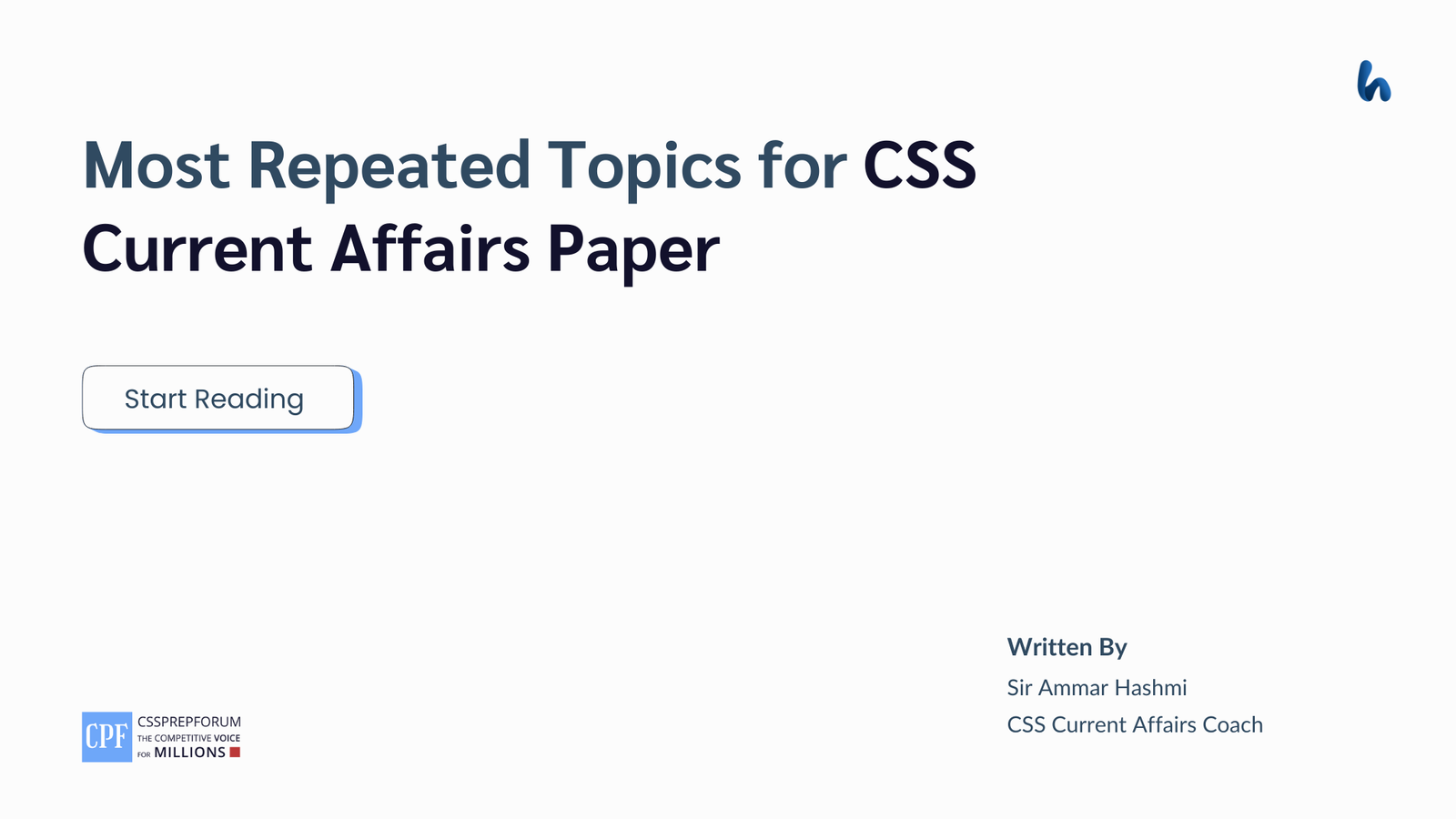Can Globalization and Nationalism Coexist in the Long Run? | Editorials by CSS & PMS Aspirants
The following article, “Can Globalization and Nationalism Coexist in the Long Run?”, is written by Nauman Ahmad, a student of Sir Syed Kazim Ali. Moreover, the article is written on the same pattern, taught by Sir to his students, scoring the highest marks in compulsory subjects for years. Sir Kazim has uploaded his students’ solved past paper questions so other thousands of aspirants can understand how to crack a topic or question, how to write relevantly, what coherence is, and how to include and connect ideas, opinions, and suggestions to score the maximum.

The debate over whether globalization and nationalism can coexist is one of the most pressing issues of the time. While globalization fosters economic, cultural, and political integration, nationalism promotes sovereignty; self-reliance; and the preservation of cultural identity. Indeed, these two ideologies seem to oppose each other directly, making their long-term coexistence unlikely. For instance, the steady decline of globalization – evident in trade wars, disrupted supply chains, restrictive immigration policies, and the resurgence of populist leaders – signals a shift toward nationalism. Therefore, as countries prioritize their interests over collective progress, the world inches toward a more divided landscape, raising concerns about global cooperation’s future.

The Conflict Between Globalization and Nationalism
Before stepping ahead, understanding the clear conflict between two opposing ideologies is paramount. First, globalization champions interconnectedness, which allows people, goods, and ideas to move freely across borders. It fosters international trade agreements, cross-cultural exchanges, and economic interdependence. In contrast, nationalism emphasizes sovereignty, self-governance, and the protection of national interests, often at the expense of international collaboration. Undoubtedly, nations seeking to build a strong cultural and economic identity tend to resist external influences, which leads to policies that limit global integration. Thus, the inherent conflict between these ideologies makes their long-term coexistence improbable globally.
Moving forward, multiple geopolitical shifts present undeniable proof that globalization is unravelling, driven by the relentless rise of nationalism across the world. First and foremost, disruptions in global supply chains illustrate the decline of globalization and the rise of nationalism. Recent geopolitical tensions, particularly the semiconductor shortage, have prompted nations to prioritize domestic production. For example, the United States (US) has restricted semiconductor exports to China while increasing local manufacturing to reduce reliance on foreign suppliers. Such measures signal a retreat from global trade dependence, which reinforces national self-sufficiency over international cooperation. Therefore, supply chain disruptions catalyze economic nationalism, weakening globalization’s hold on the global economy.
Similarly, shifting global trade patterns indicate a move toward regionalism, ultimately nationalism, rather than globalization. In fact, countries are increasingly favoring regional trade agreements over broad, multinational partnerships. For illustration, the Comprehensive and Progressive Agreement for Trans-Pacific Partnership (CPTPP) and the African Continental Free Trade Area (AfCFTA) highlight this shift as they focus on specific regions rather than promoting worldwide economic integration. Furthermore, the de-globalization of finance, characterized by capital flow restrictions and protectionist policies, suggests a growing preference for localized economic strategies. Hence, these trends demonstrate how globalization is gradually replaced by regional cooperation and economic nationalism.
Additionally, restrictive immigration policies and border controls highlight nationalism’s dominance over globalization. Truly, many countries have tightened immigration laws by making it harder for individuals to move freely across borders. Such as, Australia’s offshore processing centers for asylum seekers; France’s strict immigration reforms; and the United Kingdom’s (UK) post-Brexit border policies reflect a global trend toward exclusion, not integration. Similarly, the rise of nationalist movements – the Scottish National Party and the Catalan Independence movement – further highlight the emphasis on sovereignty over shared global citizenship. Therefore, these policies challenge globalization’s core principles of open borders and free movement by restricting migration and reinforcing national boundaries.
Equally important is the role of populist leaders in accelerating nationalism’s ascent. No doubt, populist politicians advocate policies that prioritize national interests while distancing their countries from global institutions. For example, former US President Donald Trump withdrew from multilateral agreements like the Trans-Pacific Partnership (TPP) and imposed import tariffs. Likewise, Marine Le Pen of France’s National Rally party has championed policies to reduce France’s dependence on the European Union. Thus, these actions highlight how populism fuels nationalism, undermining globalization’s reach and effectiveness.
The Case for Globalization’s Revival
However, significant measures can revive globalization as it remains a crucial driver of economic growth and international stability. Verily, reforming global institutions, such as the World Trade Organization (WTO) and the United Nations (UN), can enhance their ability to enforce policies effectively. Additionally, strengthening international treaties and ensuring transparency in global governance can restore confidence in globalization. Thus, if these institutions adapt to contemporary challenges, they can play a pivotal role in maintaining global integration despite the rise of nationalist sentiments.
Furthermore, multilateral agreements continue to show globalization’s relevance. And the Paris Agreement on climate change is a prime example of successful global cooperation, bringing nations together to address a common threat. By fostering such agreements, countries can demonstrate that globalization is not only beneficial but also essential for tackling global challenges. Simply put, strengthening diplomatic ties and enhancing collaboration in areas, such as climate action and pandemic response, can reinforce the significance of globalization.
Nationalism and Globalization Can Coexist
Nevertheless, some argue that globalization and nationalism are not entirely incompatible. Nations can maintain sovereignty while engaging in selective global partnerships that align with their national interests. For instance, countries may adopt protectionist economic policies while participating in international trade agreements. Thus, this approach allows nations to reap the benefits of globalization without fully surrendering their autonomy.
Another perspective suggests that globalization and nationalism can exist in a dynamic balance, where nations prioritize domestic needs while maintaining selective global engagement. Indeed, technological advancements, such as digital trade and remote work, enable countries to benefit from global markets without requiring extensive physical integration. In this way, a hybrid model of globalization and nationalism could emerge, allowing both ideologies to coexist under certain conditions.
An Uncertain Future
To conclude, the growing emphasis on nationalism, coupled with the retreat from globalization, raises concerns about the future of global cooperation. While pragmatic measures – institutional reforms and multilateral agreements – can revive globalization, the rise of economic nationalism; restrictive immigration policies; and populist leadership indicate a shift away from global integration. And if these trends persist, globalization may decline – giving way to a more fragmented world order. However, if nations find a way to balance national interests with global collaboration, a redefined version of globalization may still be possible. So, the coming years would determine whether these two forces can coexist or if one would ultimately prevail over the other.

CSS Solved Past Papers’ Essays
Looking for the last ten years of CSS and PMS Solved Essays and want to know how Sir Kazim’s students write and score the highest marks in the essays’ papers? Then, click on the CSS Solved Essays to start reading them.
CSS Solved Essays
CSS Solved General Science & Ability Past Papers
Want to read the last ten years’ General Science & Ability Solved Past Papers to learn how to attempt them and to score high? Let’s click on the link below to read them all freely. All past papers have been solved by Miss Iqra Ali & Dr Nishat Baloch, Pakistan’s top CSS GSA coach having the highest score of their students. General Science & Ability Solved Past Papers












